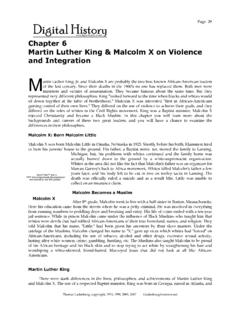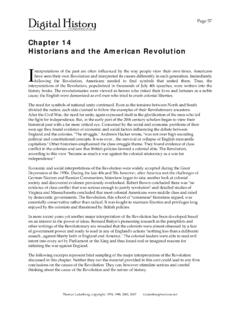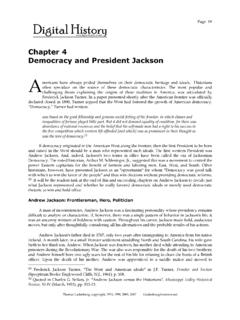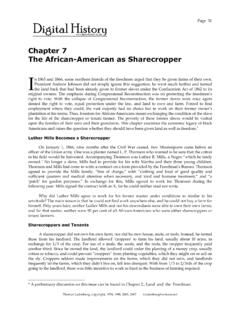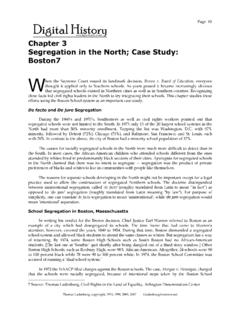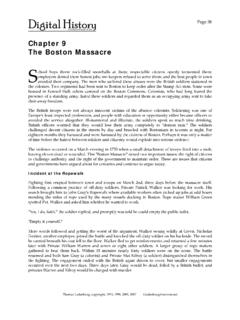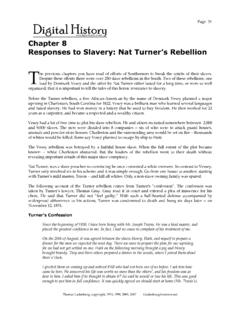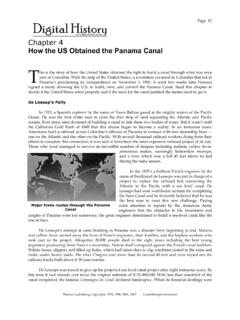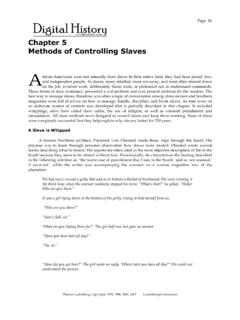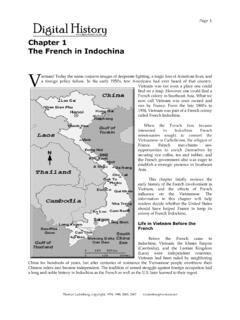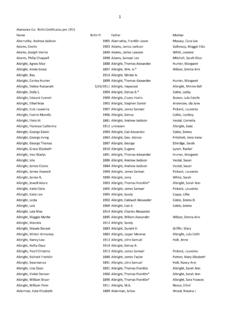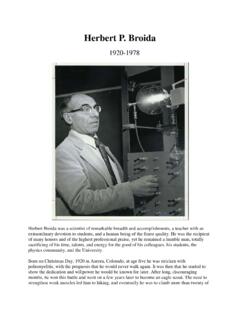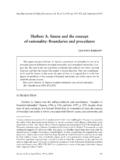Transcription of Chapter 7 Herbert Hoover and the Depression H
1 Page 31 Thomas Ladenburg, copyright, 1974, 1998, 2001, 2007 Chapter 7 Herbert Hoover and the Depression erbert Hoover had the bad luck to be President when the Great Depression started. It was Hoover who had to come up with the programs to stop the Depression . If he failed, the whole country would blame him for their trouble. If he succeeded, many Americans would think he was a great president. You will learn who Hoover was, what he did to end the Depression , and his reason for thinking his ideas would work.
2 You will then be asked whether you think his policies could end the Depression , and you will evaluate Hoover s performance as president. Who Was Herbert Hoover ? President Herbert Hoover was probably the best prepared and most qualified of the three presidents of the 1920 s. Born in 1874, he knew poverty from personal experience. His parents died when he was young, and Hoover was raised by two of his uncles. Since they could not afford to send him to college so Hoover worked his way through on his own.
3 One of his jobs took him deep below the ground in a coal mine for $ a day. In school, Stanford University, he studied engineering. He was such a good mining engineer that he made a million dollars before he was 40. After that, Hoover thought he had more money than he and his family needed. He decided to use his great administrative skills for the rest of his working life in government service and private charity. During World War I, Hoover ran the official relief agency helping the suffering people in Belgium.
4 He was called back to the to head up the Food Administration under the Democrat, President Woodrow Wilson. His work impressed people so much that many Democrats wanted him to represent their party in the next Presidential election. But, Hoover was a Republican and served as a very distinguished Secretary of Commerce under Presidents Harding and Coolidge. From his position in the cabinet, Hoover spoke for and carried out the conservative policies of Presidents Harding and Coolidge.
5 He gained a reputation as a good organizer and leader, and was a popular choice among Republicans to run for President in 1928. He is much remembered for his acceptance speech at the Republican National Convention, that the policies the Republican Party followed the past eight years would soon end poverty in America. Many American believed him and voted him to a landslide victory of million votes to 15 million for the Democrat s Alfred E. Smith. President Hoover Faces the Depression Unfortunately, Hoover did not end poverty in the as he predicted.
6 In fact, he had to face the worst Depression in American history. The stock market crashed on October 29, 1929, seven months after Hoover became president. The market kept declining for the rest of that year. Many banks that held bad stocks or made bad loans had to close their doors. Businesses laid off workers; many closed down completely. Millions of people could not find jobs. Thousands of homeless people had no place to go, and no one to help them. Although farmers could not sell surplus crops, hungry people in the cities could not afford to buy food.
7 HPresident Hoover Page 32 Thomas Ladenburg, copyright, 1974, 1998, 2001, 2007 In facing these problems, Hoover was guided by principles which he believed all his life. As a student working his way through college, as a successful businessman, and as a leader in government, Hoover was a firm believer in trickle down and an opponent of government coercion of any kind. He believed businessmen should be free to pursue their self interest, and the government should not tell people what to do.
8 He had been taught these ideas in college and had watched America grow while following them. The fact that he himself had made his fortune without government help reinforced Hoover s belief that people should not look for handouts from their government when they were in trouble. Hoover 's anti- Depression policies were based on his fundamental beliefs, and the theories advocated by the best economists at the time. As you read the basic policies Hoover followed, ask yourself whether you agree with his reasons for following these ideas.
9 Belief in Volunteerism Hoover thought the Federal government did not have a right to force people to do anything. He thought that using the government to solve basic economic problems, would do more to harm America's liberties than it would help its economy. He therefore relied on people s good will to do things for others. For instance, when the Depression started, Hoover called business leaders to meet him in Washington. He then asked them to keep up production and not to lay off workers or cut wages.
10 He asked neighbors to help one another and not rely on government aid. He thought that people would act on their own in a fundamentally altruistic way to end the Depression Looking at the Sunny Side President Hoover believed that it was necessary to maintain a positive outlook. He thought there was nothing fundamentally wrong with the American economy. All that was needed Hoover thought was to restore peoples confidence in the economy. Once Americans regained their confidence, Hoover believed, stock prices would rise, factories would open, and people would go back to work.
